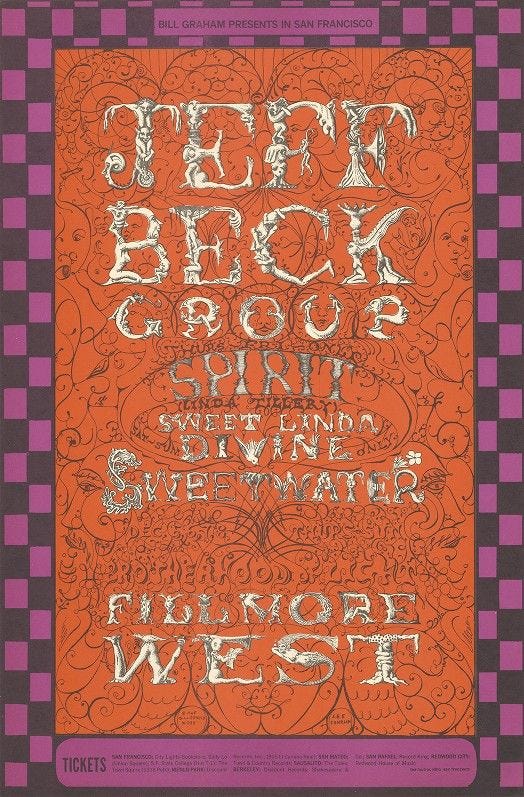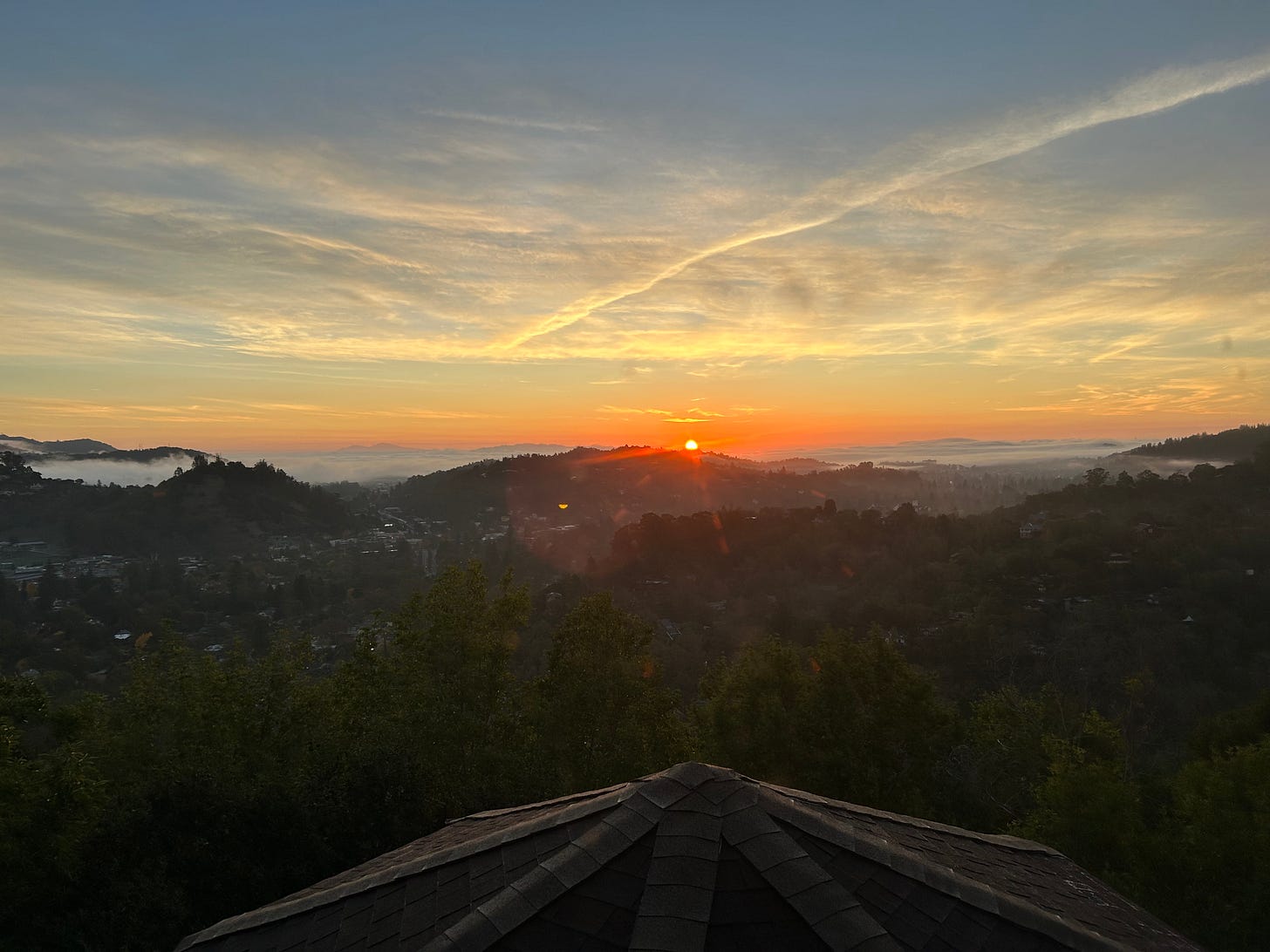The Gold, The Guitars, The Perched Edges
“Life changes in the instant. The ordinary instant.”―Joan Didion
"The accounts of abundance of gold are of such an extraordinary character as would scarcely command belief were they not corroborated by the authentic reports of officers in the public service."- James Knox Polk
175 years ago today, December 5, 1848, President Polk spoke in front of Congress to announce that gold had been discovered in California (the whole speech is here). It had been almost a year since James Marshall had found a golden nugget at Sutter’s Mill. John Sutter and Marshall tried to hide the discovery, worrying that any press would interfere with Sutter’s plans to build an agricultural center near Sacramento (and wanting to keep the gold for themselves). By March the news had spread to the local papers, by August to the New York papers. In a way, the President was late-on-the-draw with the news (politicians so often are), but nonetheless with his speech he triggered the start of the Gold Rush to California. Within the year, over 100,000 people headed to Northern California with hopes of striking it rich.
And you know the rest of the story: the rush brought to life a new city: San Francisco. A city filled with a mixture of crazed individuals…some successful, some not; a city based on luck, on life-gambling, on risk, on innovation, on perseverance …a wild, law-bending city…a city that at its core supported the line-walkers and the swindlers and the vigilantes and the entrepreneurs…and a hefty counterculture. Over the next century and a bit, this city whose foundation supported those who lived on the edges would be home to some of the greatest artistic movements to come out of America: The Crowd, the radical literary scene featuring Jack London, Ambrose Bierce and Joaquin Miller in the early 1900s, The Beat movement, with Jack Kerouac, Gary Snyder and Allen Ginsberg, The Figurative painting movement, with David Park, Richard Diebenkorn, Henrietta Berk and Wayne Thiebaud, and the hippy/psychedelic movement, with the musicians the poster artists and space-and-time travelers.
All jump-started by a presidential speech given 175 years ago today? Ok…maybe a stretch…but maybe not?
~~~~
Tompkins Square Records released their latest installment of the Imaginational Anthem series this past month…Number 12. Always brilliantly curated with a focus on the beauty of the acoustic guitar, this edition is a tribute to Michael Chapman, the Yorkshire musician that during his career that spanned from the 1960s to the 2010s deep-dove into musical genres as vast as folk, progressive, rock and avant garde, all linked via his musical mastery of the guitar (just check out two of his records, Window and Pachyderm to get a quick sense of how divergent his musical appetite could get).
It was Tompkins Square’s Josh Rosenthal who turned me on to Chapman’s music…for some reason I totally missed out on his recordings until my 40s. In 2011, Rosenthal had released a double CD career-spanning collection of Chapman’s solo guitar works, Trainsong: Guitar Compositions, 1967-2010. He brought an advance copy to our house in The Sunset when Kaya was still a baby…and the two of us (Kaya and myself) would listen to it late at night, when she was up after a feeding and I was craving some musical warmth. I was too tired to remember the backstory Josh had given me on Chapman, and had no idea that he had any career outside his virtuosic solo acoustic guitar playing.
Josh hosted Chapman in the basement of a store in The Mission, called Viracocha, soon after…a speakeasy type of place…where Chapman did a set of his solo guitar works. It was there that I both met him, and had conversations with some other concert goers where I learned about the other sides to his art: if I liked what I was hearing tonight, I should go back and listen to his 1960s/early 1970s albums, when he was a part of the blues/prog movements in England. I started listening to Window…and Rainmaker and began to understand how deep of an artist he was.
In 2012 Rosenthal released a compilation of famous friends covering Michael Chapman’s music called, Oh Michael, Look What You've Done: Friends Play Michael Chapman. The set includes covers by Lucinda Williams, Thurston Moore, Meg Baird, Hiss Golden Messenger among others and is a great celebration of the of the diverse artistic worlds Chapman inhabited. Chapman died in 2021 and Rosenthal had an idea to honor his legacy again, by going to his home turf of Yorkshire, known for its plethora of musicians, and having a friend of Chapman’s curate a record worth of covers from the artists of the area. He even commissioned a local artist to draw the cover, which is beautiful.
The result is Imaginational Anthem Vol. XII: I Thought I Told You - A Yorkshire Tribute to Michael Chapman and once again celebrates all the sides of his artistry: his folk music, his solo guitar playing, his experimentation, through the eight tracks by local Yorkshire artists, none of whom I had heard of before. I have the beautiful vinyl edition (recommended) and am most moved by Katie Spencer’s sweet stripped-down rendition of one of my favorite of Chapman’s songs You Say (from his record Rainmaker) and Holly Blackshaw’s This Mortal Coil style cover of March Rain (Ivo would love it). Part of the job of record label wonk is to put out records that hold up the legacy and importance of the artist, of the art. Imaginational Anthem Vol. VII does not only accomplish this for Michael Chapman, but showcases the width and breath of inspiration coming out of Yorkshire. One of my favorite records of the year thus far.
SHORT CONVERSATIONS WITH POETS: GARY SNYDER
I have been digging into Jesse Nathan’s Short Conversations With Poets series on the McSweeney’s website. Nathan’s dive into a poet’s process and style is fascinating…and the (very) short conversations are pretty funny. I’ll take any conversation with the 93-year-old Snyder, even in this case if it is a conversation of just one sentence…
Rare collection of recordings by Anthony Braxton enters library’s digital collections
“The Irving S. Gilmore Music Library partnered with the Tri-Centric Foundation to digitally preserve and provide online access to a treasure trove of rare archival material: 751 audio and video recordings by Anthony Braxton” and the recordings are searchable and streamable on the website…
The Barry “The Fish” Melton Interview: Wisdom, Peace, Love, Philosophy & Music
“I think the San Francisco Bay Area *was* a mecca for the avant-guard and artists in the 1960's because it was inexpensive and comparatively free-thinking.”
Book review: Yasunari Kawabata’s The Rainbow reflects the deep spiritual ache of post-war Japan
I love the quiet prose of Kawabata: The Snow Country, Thousand Cranes…stories that are as quiet as lullabies. Looking forward to digging into this post WW2 piece translated into English for the first time…
Tom Waits picked his 20 favourite albums of all time
“Songs really are like a form of time travel because they really have moved forward in a bubble…Everyone who’s connected with it, the studio’s gone, the musicians are gone, and the only thing that’s left is this recording which was only about a three-minute period maybe 70 years ago.”
William Friedkin Interview Fritz Lang About Filmmaking, Joseph Goebbels, and Art
Happy Birthday to Fritz Lang. I recently stumbled upon this interview that blew my mind…had no idea it existed….
Sunday Morning Blues
By: A. D. Winans1
there is this kind of motionless motion
children crying themselves to sleep
the taste of sunsets for breakfast
and champagne for lunch
there is this kind of mellow music
hills made of wild strawberries
salt on hard boiled eggs
Peanuts in the comic strips
and radio DJ’s with god awful jokes
that see me through another morning
there is this kind of sadness
the feeling of dull razor blades
sliding across smooth skin
Marilyn Monroe suicides and weekends
with nothing to do
heart attacks from love or lack of it
funerals with no mourners
poets with little future
and lovers with no one
to love
Failed to render LaTeX expression — no expression found
“we are imperfect mortal beings, aware of that mortality even as we push it away, failed by our very complication, so wired that when we mourn our losses we also mourn, for better or for worse, ourselves. as we were. as we are no longer. as we will one day not be at all.”
― Joan Didion
Thank you Patris for this poem….















